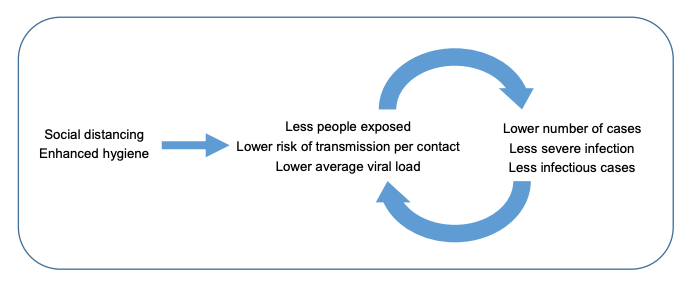What Does Social Distancing Mean?

Since the onset of the coronavirus pandemic, the term social distancing has become a buzzword. Social distancing means remaining out of group settings (like church, small groups and restaurants), avoiding mass gatherings (like concerts, sporting events and festivals) and maintaining distance from other people when possible – think of this as a six-foot circle.
Why is social distancing suddenly a thing?
When a virus or other contagion begins to spread in a community, limiting contact between people can help limit exposure to the virus and limit the number of cases. Coupled with stronger hygiene methods like frequent handwashing, which can limit transmission of viruses even when someone is exposed, social distancing has the ability to reduce community spread and shorten an epidemic.

Who should practice social distancing?
In short, everyone. The Centers for Disease Control and Prevention first recommended March 11 that people at the greatest risk — over 60 or who have underlying conditions like diabetes, heart disease or lung issues or compromised immune systems — practice social distancing. But now the government is recommending everyone step up social distancing to limit their exposure, as well as their risk of spreading the virus to others.
But what is social distancing and how do I practice it?
Social distancing isn’t just staying at home in isolation. It’s also protecting yourself when you have to go into public — think elbow rubs instead of handshakes. Here’s a list of steps researchers say you can take to practice good social distancing.
At home:
- Practice enhanced hand washing and sanitation.
- Avoid touching your face.
- Avoid handshakes and hugs.
- Disinfect shared and highly trafficked surfaces like remote controls, thermostats, counter tops and door handles on a regular basis.
- Limit visitors to just those who are absolutely essential (and well).
- Open your windows or adjust your air conditioning to increase ventilation.
If a member of your household becomes sick:
- Practice good cough and sneeze etiquette.
- Provide sick members of households their own room and one caretaker.
- Keep the door room(s) of sick family member(s) closed.
- Supply (if available) , the ill family member and caretaker with simple surgical or dust masks.
- Consider extra protection or alternative accommodations for household members age 60 and older
At work:
- Skip shaking hands.
- Promote cough and sneeze etiquette.
- Use videoconferences to avoid group gatherings.
- Postpone large meetings.
- Use sanitation best practices with wipes and alcohol-based hand sanitizer stations.
- Disinfect high-touch surfaces.
- Work from home when possible.
- Stay at home if you’re sick.
- Eat at your desk instead of in lunchrooms.
By reducing the number of contacts people make, social distancing can reduce transmission of contagious viruses at the community level. When used along with enhanced hygiene efforts, researchers say outbreaks like coronavirus can be quickly contained or, at least, infections can be mitigated.
* The chart above comes from a recently published study on social distancing.